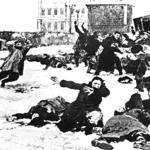This Week in People’s History, Jan 22–28

The Long, Long, Road to Revolution
JANUARY 22 IS THE 120TH ANNIVERSARY of the beginning of the end for one of the world's few remaining absolute monarchies, the 183-year-old Russian Empire. In January 1905 the Russian people began a 12-year process of forcing the Czar to give up his throne.
During the weeks before Jan. 22, tens of thousands of St. Petersburg workers had gone on strike, in part to demand the rehiring of workers who had been fired for political reasons, and in part to protest wages and working conditions that were under the Czar's control. The strike shut down hundreds of businesses including both the St. Petersburg electricity supply and the city's newspapers.
The Czar put the city under martial law, and the strikers planned a march to petition the Czar for an 8-hour day and increased minimum wage. When the unarmed workers' procession neared the Winter Palace, it was fired on by the palace guard. At least 200 protesters died in what is known as Bloody Sunday, and the toll may have been five times that number.
The news that hundreds of peaceful protesters had been killed caused public support for the Czar and his army to evaporate. Efforts to end the autocracy were not new, but the bloodletting gave them a new immediacy. For the next nine months Russia was rocked by massive anti-government strikes, mutinies, land-takeovers and demonstrations, until the Czar bowed to the pressure and promulgated a new, reformist, constitution, under which he would, for the first time, share power with an elected legislature.
Bloody Sunday was the first step in a process that forced the Czar to abdicate 12 years later in 1917. https://www.marxists.org/history/ussr/events/1905/index.htm
‘Can’t Nobody Lick Us’
JANUARY 24 IS THE 85TH ANNIVERSARY of the release of The Grapes of Wrath, a cinematic masterpiece directed by John Ford and starring Henry Fonda and Jane Darwell.
Based closely on John Steinbeck’s novel, it is filmed in the style of a documentary about the plight of the Joad family, Oklahoma sharecroppers who have lost their farm in the Great Depression and been forced on an arduous journey that takes them to California’s Central Valley in search of work.
The Joads’ struggle to survive is depicted with enormous sympathy for their plight. The film also makes it easy to understand Tom Joad’s radicalization and his resulting determination at movie’s end to devote himself to the fight for workers’ rights. https://labornotes.org/blogs/2020/06/review-grapes-wrath
Voter Suppression Meets Its Match
JANUARY 25 IS THE 60TH ANNIVERSARY of an electrifying moment in the struggle to end Jim Crow voter suppression.
In 1965 the Southern Christian Leadership Conference’s voting rights campaign in Selma, Alabama, was only three weeks old when Sheriff Jim Clark tried to shove a group of activists away from the county courthouse. One of the protesters, 54-year-old Annie Lee Cooper shoved back and then punched Clark in the face. When several deputies grabbed Cooper and held her down, Cooper yelled at Clark. “I wish you would hit me, you scum!”
Clark responded by smashing his nightstick against Cooper’s face, an image that was captured by an Associated Press photographer. The photo of the Sheriff clubbing a pinned-down demonstrator appeared on the front pages of many newspapers and was featured in televised news reports.
Less than two months later, as demonstrations and sometimes brutal arrests at the courthouse continued, a bill to outlaw racist voter suppression was introduced in the U.S. Senate. After it passed both the Senate and the House by substantial majorities, it became law on August 6, 1965. https://snccdigital.org/people/annie-lee-cooper/
Fluoride’s Safe to Drink, Period
JANUARY 26 IS THE 80TH ANNIVERSARY of the beginning of the first experimental addition of a small amount of fluoride to drinking water to determine if it would result in a significant reduction of tooth decay.
The 1945 experiment was conducted in Grand Rapids, Michigan, by investigators working for the U.S. Public Health Service. By 1956 it was clear that Grand Rapids residents born after the experiment began had a 60 percent reduction in tooth decay.
It was suggested in 1990 that fluoridated water might cause cancer. The possibility of a link between fluoride and cancer has been examined intensively and repeatedly for more than 30 years, and no evidence of such a link has been discovered. https://www.nidcr.nih.gov/health-info/fluoride/the-story-of-fluoridation
Designing the Trail of Tears
JANUARY 27 IS THE 200TH ANNIVERSARY of a “special message” in which President James Monroe asked Congress to adopt the policy of compelling Native Americans to resettle west of the Mississippi River.
Monroe’s 1825 message was the first formal expression of what by 1830 became the U.S. government’s settled policy of using negotiation or, when negotiation failed, military force, to exclude unassimilated Native Americans from the eastern third of the country. Monroe’s message outlined the policy and asked the House and the Senate to write legislation that would turn the policy into law.
Not all members of Congress were in agreement with Monroe’s proposal. It was not until 1830 that the House and the Senate passed the Indian Removal Act, which ratified the policy Monroe had advocated in 1825.
Carrying the policy out resulted in the Trail of Tears, which compelled some 75 thousand Native Americans to begin the arduous journey to the west of the Mississippi. At least ten thousand died before reaching their destination. https://nationalhumanitiescenter.org/tserve/nattrans/ntecoindian/essays/indianremoval.htm
For more People's History, visit
https://www.facebook.com/jonathan.bennett.7771/
